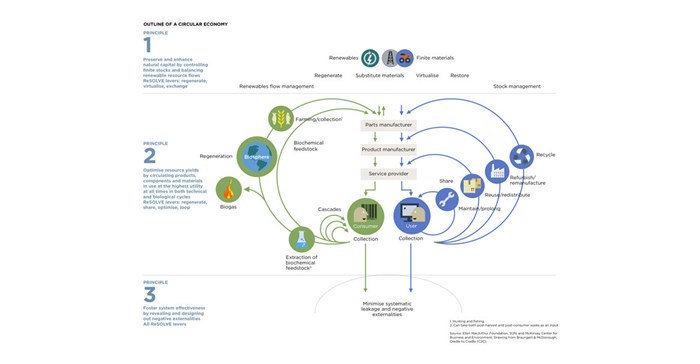Reusability and longevity of products are needed from manufacturers to ultimately return materials back into the economy for further use.

View the full circular economy system diagram.
The Institute of Waste Management of Southern Africa (IWMSA) is a non-profit, voluntary, member-based organisation that promotes responsible and professional waste management practices. A key focus for the industry body is to educate and encourage environmentally acceptable waste management processes, to subsequently divert waste streams from landfill sites.
President of the IWMSA, Prof. Suzan Oelofse, says, “Southern Africa’s landfill space is dwindling. In reality, zero waste to landfill is not possible as waste treatment technologies also result in by-products that need to be disposed of. We should however strive to minimise waste going to landfill as far as possible through avoidance, reuse and recycling. There are various implementable processes available to help divert precious resources and materials from ending up at these sites. A circular economy is key in achieving this and is all about creating a restorative and regenerative system – especially when it comes to the manufacturing industry.”
GreenCape, a sector development agency based in the Western Cape and an IWMSA organisational member, promotes the development of a green economy. The organisation has an Industrial Symbiosis (IS) programme in the Western Cape (WISP), which has proven to be very fruitful in diverting one company’s waste for another company’s benefit. The National Cleaner Production Centre of South Africa (NCPC-SA) delivers IS programmes in KwaZulu-Natal (KISP) and Gauteng (GISP).
WISP programme manager Sarah O’Carroll explains that industrial symbiosis is a valuable metric in working towards a circular economy. “Industrial symbiosis is a circular economy approach in the manufacturing sector, where one company’s waste is used as a raw material by another company – ultimately fostering mutual economic, social and environmental benefits,” says O’Carroll.
The Ellen MacArthur Foundation, a thoughtleader in the circular economy, identified critical building blocks for implementing a circular economy. These include:
O’Carroll mentions that the 3 R’s, reduce, reuse and recycle, are common place for sustainable initiatives; however, ‘maintenance’ and ‘repair’ are equally important so that products and resources can be used multiple times. There are numerous benefits when it comes to circular economy practices, including: economic benefits (cost savings and revenue opportunities), resource efficiency, reduced greenhouse gas emissions and, job creation.
The challenges for implementing circular economy principles in waste management in South Africa, as identified by the WISP programme, include: some products are not designed well for disassembly and reuse as design is primarily done abroad; the business case for alternative uses of end-of-life materials is not strong enough; and the fact that many different skill types are needed for a circular economy to work.
“Innovation is vital when it comes to implementing circular economy practices in South Africa, especially when adapting technologies which may be used in developed countries, or developing new technologies from scratch,” says O’Caroll. “South Africa, with its smaller scale and lower density of manufacturing activity, requires distributed solutions that are financially viable. Education and awareness are critical. There is a stigma around the use of secondary materials, fortunately, there are cases in the construction sector where secondary materials have better properties compared to virgin materials,” explains O’Carroll.
Oelofse mentions that government is promoting a restorative system in waste management. The most recent transformation of the waste sector on government level occurred primarily in three areas, namely: regulatory reforms (NEMWAA 2014, regulations and Norms and Standards), institutional reforms (Waste Management Bureau), and economic reforms (pricing strategy).
“The IWMSA and its members urge all industry players to move towards a restorative, circular waste economy in South Africa,” Oelofse concludes.
To find out more on industrial symbiosis programmes, go to www.greencape.co.za. For more information on the IWMSA, go to www.iwmsa.co.za.